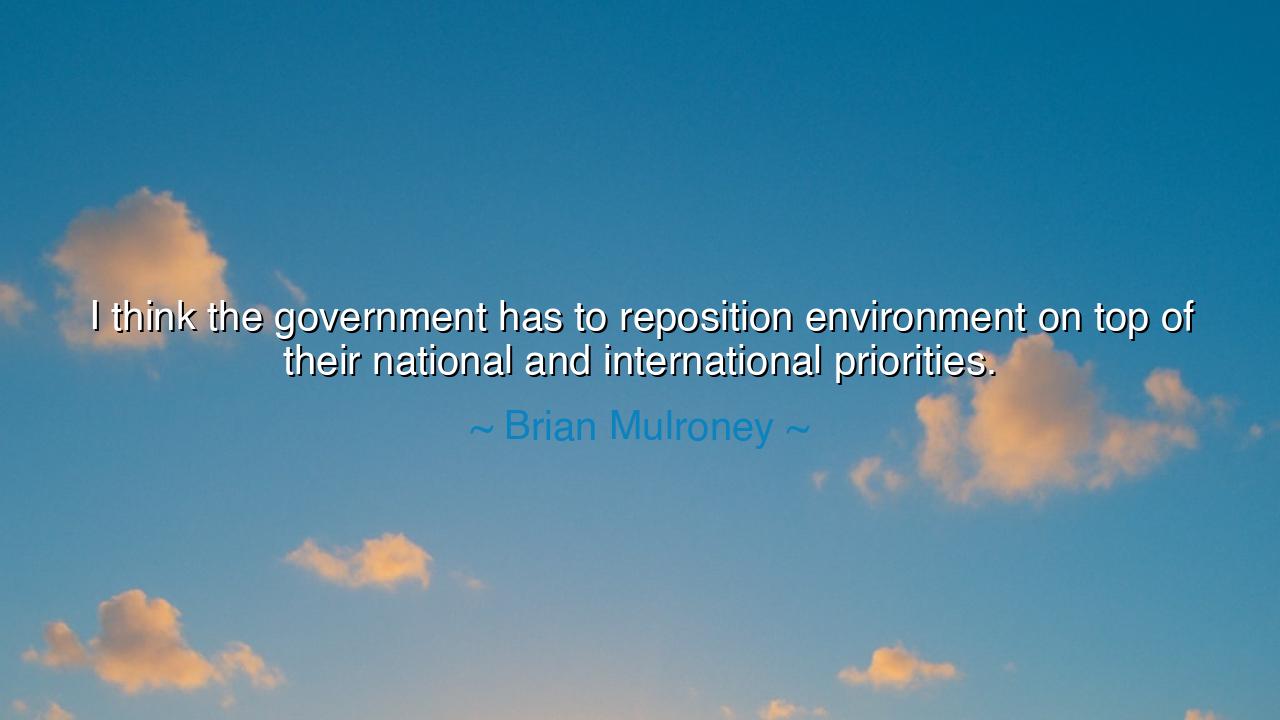
I think the government has to reposition environment on top of
I think the government has to reposition environment on top of their national and international priorities.






In a voice calibrated like a compass, Brian Mulroney declares: “I think the government has to reposition environment on top of their national and international priorities.” The sentence is spare, but it turns like a key in a long-stuck lock. To reposition is not to add a fresh ornament to the agenda; it is to move the foundation stone back beneath the house. It is to confess that policy without soil, water, air, and living kin at its center is a splendid façade over hollow rooms. Thus the saying bids rulers put first what quietly holds everything else up.
To set the environment “on top” is a paradox—top in rank, base in function. The ancients would have nodded: wise builders tend the well before they gild the arch. When national priorities chase only growth or prestige, they spend down the unseen capital—fertile earth, stable climate, clean rivers—upon which armies, markets, and schools depend. And when international priorities ignore the shared breath of nations, diplomacy becomes a theater of masks while the stage itself burns. Mulroney’s counsel is to order loves rightly: let stewardship govern ambition.
The meaning of this oracle ripens in its origin. In an age when rivers foamed and forests yellowed under distant smokestacks, Canada helped convene oaths that changed the weather of politics: common cause against acid rain, vigilance for the thinning ozone, a neighborly treaty to cleanse cross-border air. Such chapters teach that statesmanship is not only speech and ceremony; it is the craft of binding environment to diplomacy, so that treaties become rain that falls sweeter, skies that heal, children who cough less. From this history the line gathers its authority: it is not a wish—it is a recollection of what works.
Consider a lamp from that era. When lakes in the northeast dulled and fish vanished, the answer did not come from a single town. It came when two nations lifted the environment to the cabinet table and signed an air-quality pact with teeth. Emissions fell; waters woke. Or take the gathering where the world agreed to retire chemicals that gnawed the sky: the ozone wound began to knit because ministers treated science like a weather report, not a rumor. These stories are receipts: whenever the government sets environment at the apex of priorities, measurable mercy follows.
Why, then, does it so often “fall to the wayside”? Because the rewards of neglect are immediate—cheap fuel, quick applause—while the dividends of care accrue slowly and without spectacle. Budgets bow to headlines; election clocks tick faster than tree rings. Mulroney’s sentence is a rebuke to that impatience. It asks leaders to trade the sugar of now for the bread of later, to anchor national strength in living systems, and to measure success not only in quarters but in quarters of a century.
What, then, shall we do with this teaching? Let government braid environment through every ledger line: green procurement as default; health budgets that count asthma days avoided; agriculture that pays for soil kept, not only grain sold; infrastructure that softens floods and cools heat, not merely dazzles. In the international field, yoke trade to stewardship—prefer goods born without poisoning their birthplace; fund forest guardians as seriously as border guards; make climate resilience as basic to aid as clean water once became. Publish targets, audit them in daylight, and bind them to the salaries and survival of ministries.
And for citizens and cities—the smaller sovereignties—practice the same order of loves. Vote for platforms that place environment first and prove it with numbers; join the quiet armies of restoration and monitoring; ask your institutions—schools, hospitals, ports—to account for their footprints as carefully as their finances. Teach children the names of the winds and the work of a watershed, that affection may root duty. For when the environment is truly repositioned to the top of our priorities, law itself becomes a form of love, power becomes service, and the nation stands not over its land but with it—strong enough to endure, humble enough to belong.






AAdministratorAdministrator
Welcome, honored guests. Please leave a comment, we will respond soon